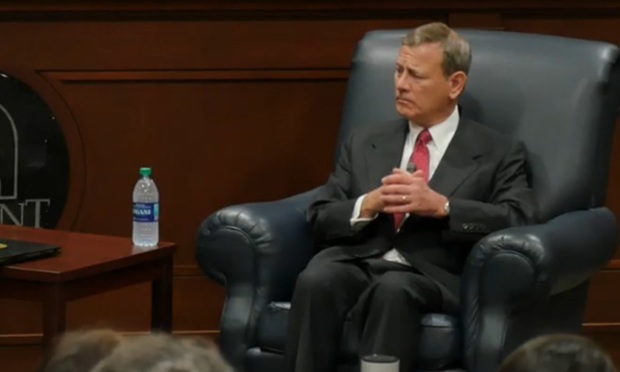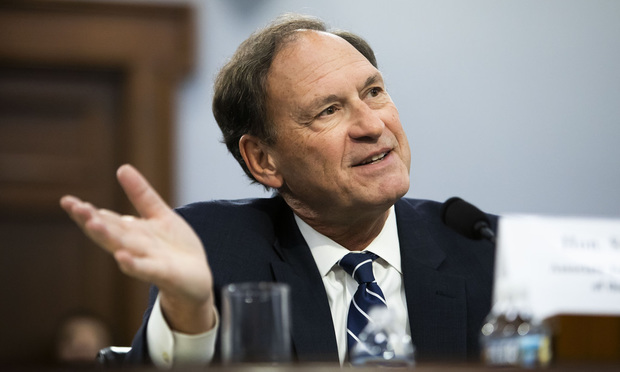'Balanced Approach': How Roberts Marshaled Near Unanimity in Trump Records Cases
Responding to Justice Clarence Thomas in one of the cases, Chief Justice John Roberts said in a footnote: "The daylight between our opinion and Justice Thomas's 'dissent' is not as great as that label might suggest."
July 09, 2020 at 03:24 PM
6 minute read
The original version of this story was published on National Law Journal
 Chief Justice John Roberts Jr. appearing last year at Belmont University in Nashville. Screen grab via YouTube.
Chief Justice John Roberts Jr. appearing last year at Belmont University in Nashville. Screen grab via YouTube.
In two cases fraught with political overtones, Chief Justice Roberts Jr.'s opinions in the Trump financial records cases did not achieve unanimity across an ideologically divided bench, but his effort came very close and protected, as he has tried in several cases this term, the appearance of an independent U.S. Supreme Court.
The chief justice's opinions were, in a sense, classic Roberts opinions, where he rejects extreme positions, applies a middle ground and leaves the door ajar for losing parties to make new arguments. And in doing so, he alone or with other conservative colleagues forms a cross-ideological majority.
In both Trump-related cases Thursday, Roberts led a 7-2 majority, with Trump appointees Neil Gorsuch and Brett Kavanaugh joining the majority. Justices Clarence Thomas and Samuel Alito Jr. dissented in both cases.
Roberts' approach in the Trump-related cases was similar to his approach in this term's decision involving the Trump administration's plan to end the deferred deportation policy for so-called Dreamers, in the term's abortion clinic case, June Medical Services v. Russo, and in last term's case rejecting a citizenship question on the 2020 census. He and Gorsuch also joined with the court's liberal wing in ruling last month that Title VII barred discrimination on a basis of sexual orientation and gender identity.
In the case Trump v. Mazars, where three House congressional committees sought President Donald Trump's financial records from his accounting firm and two banks, Roberts rejected tests for complying with those subpoenas that were proposed by the president's lawyers, the U.S. solicitor general and the U.S. House of Representatives general counsel.
The standard urged by the president and solicitor general would have required the House committees to "show that the requested information satisfies a 'demonstrated, specific need,' and is 'demonstrably critical' to a legislative purpose."
Those standards, Roberts said, were applied to information protected by executive privilege. He refused to "transplant" them to nonprivileged, private information.
"The standards proposed by the President and the Solicitor General—if applied outside the context of privileged information—would risk seriously impeding Congress in carrying out its responsibilities, giving short shrift to its important interests in conducting inquiries to obtain information needed to legislate effectively," Roberts wrote.
But he wasn't willing to accept the House's approach either. The House argued the subpoenas should be upheld because they relate to "a legitimate legislative purpose" or "concern a subject on which legislation could be had."
In rejecting that approach, Roberts wrote: "Far from accounting for separation of powers concerns, the House's approach aggravates them by leaving essentially no limits on the congressional power to subpoena the President's personal records. Any personal paper possessed by a President could potentially 'relate' to a conceivable subject of legislation, for Congress has broad legislative powers that touch a vast number of subjects."
In the end, Roberts wrote, a "balanced approach is necessary," and he provided four factors that courts should consider on remand.
The only justices refusing to join the majority were Thomas and Alito, who dissented in separate opinions.
Thomas, who would have reversed in full, wrote the power to subpoena private, nonofficial documents is not a necessary implication of Congress' legislative powers. "If Congress wishes to obtain these documents, it should proceed through the impeachment power," Thomas said.
Alito said the factors on remand that Roberts proposed were not adequate. He would have required a much more detailed showing by the House committees of the need for the information.
 Justice Samuel Alito Jr. testifying in 2019. Credit: Diego M. Radzinschi / ALM
Justice Samuel Alito Jr. testifying in 2019. Credit: Diego M. Radzinschi / ALMIn the case Trump v. Vance, involving a state grand jury subpoena for Trump's tax records, Roberts again rejected the standards proposed by Trump's lawyers and the solicitor general. A president has no absolute immunity from a state criminal subpoena, he wrote, and there is no requirement of a "heightened standard of need" for the issuance of such a subpoena.
"Two hundred years ago, a great jurist of our Court established that no citizen, not even the President, is categorically above the common duty to produce evidence when called upon in a criminal proceeding," Roberts wrote. "We reaffirm that principle today and hold that the President is neither absolutely immune from state criminal subpoenas seeking his private papers nor entitled to a heightened standard of need."
But he also wrote that Trump was not without recourse in the face of a subpoena. The president could argue that compliance would impede his constitutional duties or he could raise subpoena-specific constitutional challenges to it, according to Roberts.
Thomas, who dissented, agreed a president has no absolute immunity from a grand jury subpoena. But he wrote the majority should have vacated and remanded the case to the district court to decide if "the President is unable to comply because of his official duties, then he is entitled to injunctive and declaratory relief."
Responding to Thomas, Roberts, in a footnote, wrote: "The daylight between our opinion and Justice Thomas's 'dissent' is not as great as that label might suggest. We agree that Presidents are neither absolutely immune from state criminal subpoenas nor insulated by a heightened need standard. We agree that Presidents may challenge specific subpoenas as impeding their Article II functions. And, although we affirm while Justice Thomas would vacate, we agree that this case will be remanded to the District Court."
Alito, also dissenting, said he would apply a heightened standard of need for the subpoena. He wrote "the point is that we should not treat this subpoena like an ordinary grand jury subpoena and should not relegate a President to the meager defenses that are available when an ordinary grand jury subpoena is challenged."
In the end, there was no clear and unambiguous winner in either of the cases, both of which will be continued to be litigated. But perhaps, as Roberts may have intended with his carefully balanced compromise, the victor was the Supreme Court.
This content has been archived. It is available through our partners, LexisNexis® and Bloomberg Law.
To view this content, please continue to their sites.
Not a Lexis Subscriber?
Subscribe Now
Not a Bloomberg Law Subscriber?
Subscribe Now
NOT FOR REPRINT
© 2025 ALM Global, LLC, All Rights Reserved. Request academic re-use from www.copyright.com. All other uses, submit a request to [email protected]. For more information visit Asset & Logo Licensing.
You Might Like
View All
'Knowledge of Mismatch:' Fed Judge Offers Guidance on How to Hold Banks Accountable for Erroneous Transfers

'Reverse Robin Hood': Capital One Swarmed With Class Actions Alleging Theft of Influencer Commissions in January

SEC Official Hints at More Restraint With Industry Bars, Less With Wells Meetings
4 minute readTrending Stories
- 1Public Notices/Calendars
- 2Wednesday Newspaper
- 3Decision of the Day: Qui Tam Relators Do Not Plausibly Claim Firm Avoided Tax Obligations Through Visa Applications, Circuit Finds
- 4Judicial Ethics Opinion 24-116
- 5Big Law Firms Sheppard Mullin, Morgan Lewis and Baker Botts Add Partners in Houston
Who Got The Work
J. Brugh Lower of Gibbons has entered an appearance for industrial equipment supplier Devco Corporation in a pending trademark infringement lawsuit. The suit, accusing the defendant of selling knock-off Graco products, was filed Dec. 18 in New Jersey District Court by Rivkin Radler on behalf of Graco Inc. and Graco Minnesota. The case, assigned to U.S. District Judge Zahid N. Quraishi, is 3:24-cv-11294, Graco Inc. et al v. Devco Corporation.
Who Got The Work
Rebecca Maller-Stein and Kent A. Yalowitz of Arnold & Porter Kaye Scholer have entered their appearances for Hanaco Venture Capital and its executives, Lior Prosor and David Frankel, in a pending securities lawsuit. The action, filed on Dec. 24 in New York Southern District Court by Zell, Aron & Co. on behalf of Goldeneye Advisors, accuses the defendants of negligently and fraudulently managing the plaintiff's $1 million investment. The case, assigned to U.S. District Judge Vernon S. Broderick, is 1:24-cv-09918, Goldeneye Advisors, LLC v. Hanaco Venture Capital, Ltd. et al.
Who Got The Work
Attorneys from A&O Shearman has stepped in as defense counsel for Toronto-Dominion Bank and other defendants in a pending securities class action. The suit, filed Dec. 11 in New York Southern District Court by Bleichmar Fonti & Auld, accuses the defendants of concealing the bank's 'pervasive' deficiencies in regards to its compliance with the Bank Secrecy Act and the quality of its anti-money laundering controls. The case, assigned to U.S. District Judge Arun Subramanian, is 1:24-cv-09445, Gonzalez v. The Toronto-Dominion Bank et al.
Who Got The Work
Crown Castle International, a Pennsylvania company providing shared communications infrastructure, has turned to Luke D. Wolf of Gordon Rees Scully Mansukhani to fend off a pending breach-of-contract lawsuit. The court action, filed Nov. 25 in Michigan Eastern District Court by Hooper Hathaway PC on behalf of The Town Residences LLC, accuses Crown Castle of failing to transfer approximately $30,000 in utility payments from T-Mobile in breach of a roof-top lease and assignment agreement. The case, assigned to U.S. District Judge Susan K. Declercq, is 2:24-cv-13131, The Town Residences LLC v. T-Mobile US, Inc. et al.
Who Got The Work
Wilfred P. Coronato and Daniel M. Schwartz of McCarter & English have stepped in as defense counsel to Electrolux Home Products Inc. in a pending product liability lawsuit. The court action, filed Nov. 26 in New York Eastern District Court by Poulos Lopiccolo PC and Nagel Rice LLP on behalf of David Stern, alleges that the defendant's refrigerators’ drawers and shelving repeatedly break and fall apart within months after purchase. The case, assigned to U.S. District Judge Joan M. Azrack, is 2:24-cv-08204, Stern v. Electrolux Home Products, Inc.
Featured Firms
Law Offices of Gary Martin Hays & Associates, P.C.
(470) 294-1674
Law Offices of Mark E. Salomone
(857) 444-6468
Smith & Hassler
(713) 739-1250









